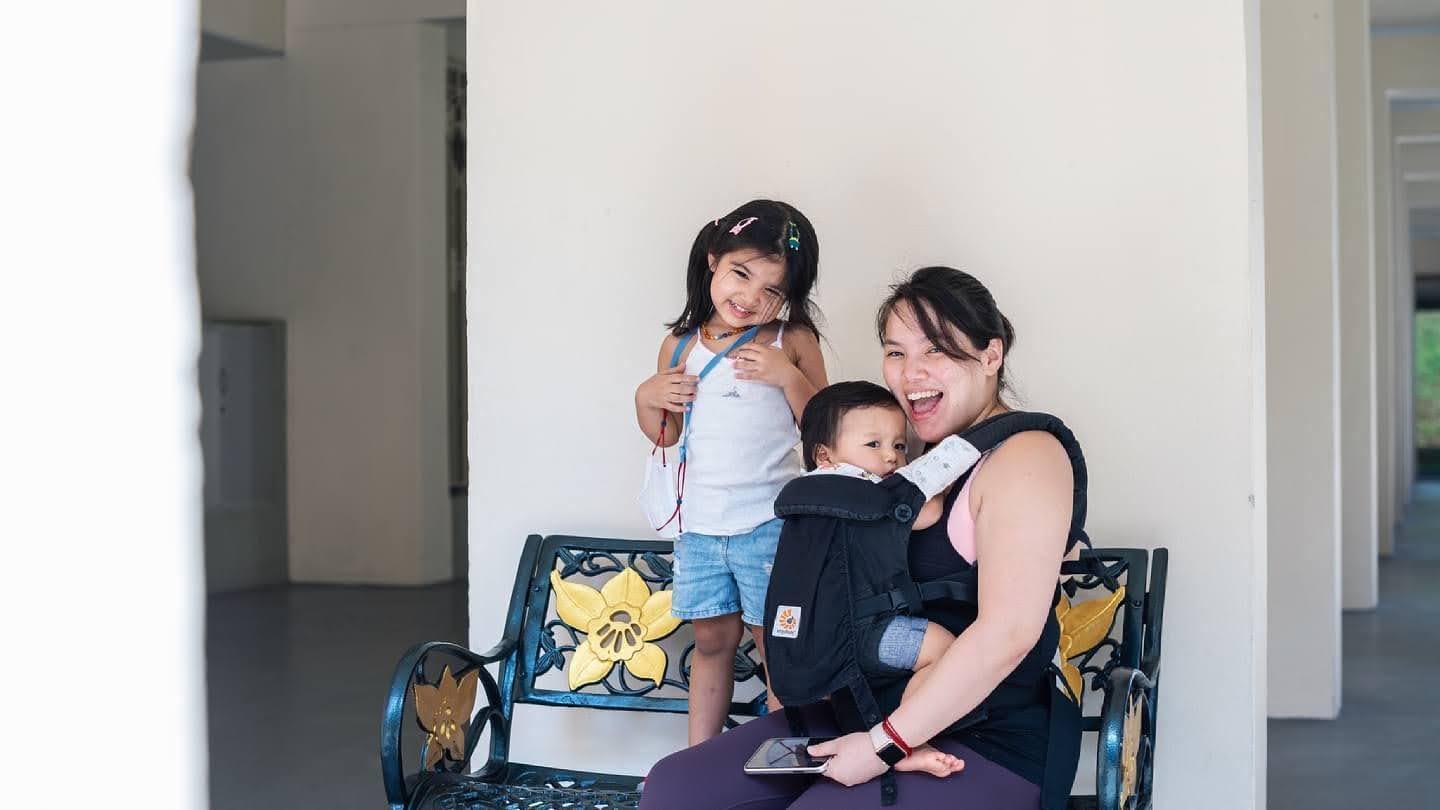With work-from-home being the norm, most parents with kids under the age of five would know how chaotic it can get at home.
For one Samantha Cheng, 33, the marketing manager gets a few extra winks in the morning while her husband Iqbal gets their two children Emily and Evan, aged four and one respectively, ready for the day.
39-year-old Sher Iqbal Texeira, a video production lead, also gets a brief respite on the weekends when his wife brings the kids over to their grandmother’s place. He spends the quiet night with his PlayStation.
To this couple, understanding the importance of “me-time” is one of the ways they become not just a better partner, but also a more hands-on parent.
 Photo courtesy of Samantha and Iqbal.
Photo courtesy of Samantha and Iqbal.
“We give and take. Knowing to divide and conquer, not always having to do things together is a pretty good thing,” said Cheng.
No fixed schedule
Breaking away from the more “conventional” parenting style of the past, the married couple are among an increasing number of Singaporean families where both parents play an equal role in contributing to and supporting the family.
When asked what their day-to-day schedule is like as working parents, they both laugh, saying there’s no such thing as a schedule, especially when you’re parents of two young children.
“There are certain things that we do on a day-to-day basis, but we learn that you don’t necessarily have to when you have children. On the weekend, he helps by taking care of the kids and [bringing] them out for breakfast so I get to sleep in. On some weekdays, I’d bring my kids to my mom’s place so he can have a quiet night in,” said Cheng.
Iqbal added that he typically takes on the role as the “fun parent” who would bring the kids to the playground and occasionally surprise them with breakfast at McDonald’s. Meanwhile, he jokingly branded his wife as the “fun police”.
That being said, there’s no clear verdict on who’s the better parent.
The older and more adventurous Emily is a daddy’s girl that looks forward to trips to the zoo while the younger and more boisterous Evan is hands down a mommy’s boy.
 Photo courtesy of Samantha and Iqbal.
Photo courtesy of Samantha and Iqbal.
 Photo courtesy of Samantha and Iqbal.
Photo courtesy of Samantha and Iqbal.
Even more challenged with pandemic
Being each other’s equal has been exceptionally important since the Covid-19 pandemic hit at a crucial point in the family’s lives.
Halfway into the pandemic in 2020, the family welcomed baby Evan into their lives.
That same year, they were also in the midst of moving, waiting for the renovation works to be over.
As if having a baby in the middle of Covid-19 wasn’t challenging enough, Cheng also had the pressure of looking for a new job, as her contract had ended for her previous role.
 Photo courtesy of Samantha and Iqbal.
Photo courtesy of Samantha and Iqbal.
Despite trying circumstances, they survived the year mainly by having each other’s back.
Cheng said: “He helped to hold the fort while I was completely sleep-deprived from a baby who did not sleep very much and had to be fed every two hours. For the first six months of Evan’s life, I had to sleep in the living room. On the weekends, Iqbal would take over and sleep on the sofa in the living room with Evan so that Emily’s sleep won’t be disrupted.”
Iqbal had also been recommending her for several jobs and connecting her to the relevant people in hopes of helping her get back into the workforce.
Important to become hands-on partners
Being a hands-on life partner to one another and engaged parents to their children are of utmost importance to the couple.
Cheng said: “With regards to the social stigma, it’s not that our perspective [on parenthood] has changed so much but as parents ourselves, it is more enforced that the ‘traditional’ way [of parenting] doesn’t exactly work.
In this day and age, it isn’t the norm anymore where only men are supposed to work while the women stay at home and look after the kids. We made a conscious decision as a couple to have children and for that to happen, we both have to put in the effort [to raise them together].
We’ve always had that understanding from the start and the only way to make it work is for both of us to be involved.”
Agreeing with his wife’s sentiments, Iqbal added: “[Being hands-on parents] was something we’ve always agreed on. But now that we are parents, we see that it’s hard to do it alone… It’s almost impossible.”
This mutual understanding between the couple doesn’t just help them to become better parents, but also more supportive partners to one another.
Witnessing children’s milestones
The couple admitted that spending more time with their children after transitioning to working from home required some recalibration but they see the upsides to it.
For one, it made them even more grateful for the “village” of support system consisting of Cheng’s mother, grandmother and their helpers who occasionally help out with taking care of the kids.
Simply being able to see them grow up and capture the milestones that they typically wouldn’t witness if they were in the office is another perk for them.
“Getting to see them grow up, that’s the most important thing. We get to see their milestones along the way. Before, it would be people telling us what they did today but now we get to see their first steps and their first words,” Iqbal gushed.
Divide and conquer
If they’ve learned anything from their short yet meaningful time as parents thus far, it is the importance of communication and the ability to divide and conquer.
Cheng explained: “A lot of times, when people think about spending time with the kids, it’s about spending time with them together [as a family]. But dividing and conquering does help because you will need some time to yourself and being able to have that quiet time truly helps a lot.”
And they’re both thankful to have found the perfect partner for each other to do just that.
Do children follow their parents’ behaviour?
Is it true when they say that the apple doesn’t fall far from the tree?
In a video produced by the Ministry of Social and Family Development, eight children from different families were placed in home settings and pretended to be “mummy and daddy” for the day.
Meanwhile, their parents observed them via a hidden camera to see if their children picked up on traditional gender stereotypes, like asking “mummy” to take care of the kids or for “daddy” to just leave the unwashed dishes in the sink.
Watch the full video here and find out how the parents reacted:
Top image courtesy of Samantha and Iqbal.
This article is sponsored by Ministry of Social and Family Development in support of Celebrating SG Women.
If you like what you read, follow us on Facebook, Instagram, Twitter and Telegram to get the latest updates.
